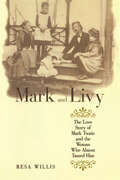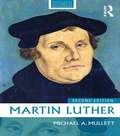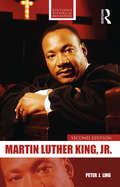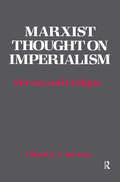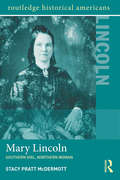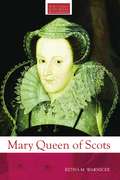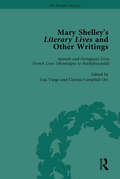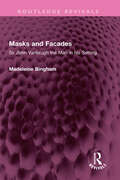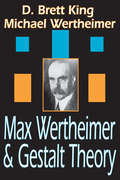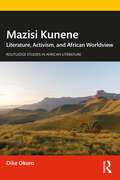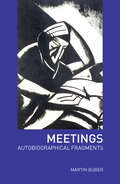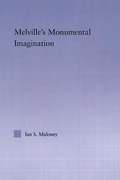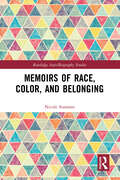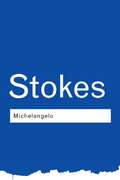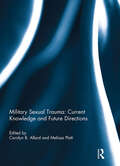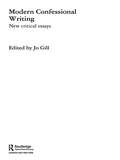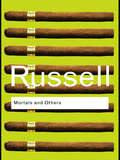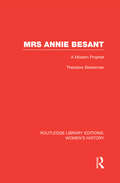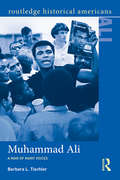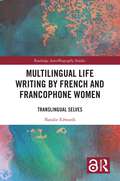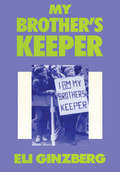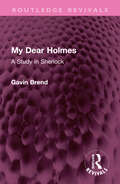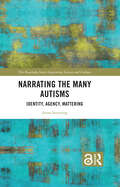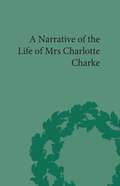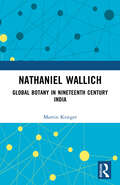- Table View
- List View
Mark and Livy: The Love Story of Mark Twain and the Woman Who Almost Tamed Him
by Resa WillisOlivia Langdon Clemens was not only the love of Mark Twain's life and the mother of his children, she was also his editor, muse, critic and trusted advisor. She read his letters and speeches. He relied on her judgment on his writing, and readily admitted that she not only edited his work, but also edited his public persona.Until now, little has been known about Livy's crucial place in Twain's life. In Resa Willis's affecting and fascinating biography, we meet a dignified, optimistic women who married young, raised three sons and a daughter, endured myriad health problems and money woes and who faithfully traipsed all over the world with Twain--Africa, Europe, Asia--while battling his moodiness and her frailty.Twain adored her. A hard-drinking dreamer with an insatiable wanderlust, he needed someone to tame him. It was Livy who encouraged him to finish his autobiography even through the last stages of her illness. When she died in 1904, Twain's zest for life and writing was gone. He died six years later.A triumph of the biographer's art, Mark and Livy presents the fullest picture yet of one of the most influential women in American letters.
Martin Luther (Routledge Historical Biographies)
by Michael A. MullettAn engaging and comprehensive new edition of this established biography provides students with an understanding of the European Reformation through the life of its key mover, Martin Luther. Working chronologically through Luther’s life, Michael A. Mullet explains and analyses Luther’s background, the development of his Reformation theology in the 95 Theses, the Diet of Worms and the creation of Lutheranism. This fully revised and updated new edition includes a chapter on the legacy and memory of Luther through the centuries since his death, looking to his influence on modern Germany and the wider world. A comprehensive chronology at the start of the book traces the important dates in Luther’s personal and political life. This is a vivid, scholarly and empathetic biography of Martin Luther, which will be essential reading for all students of the European Reformation, early modern history and religious history.
Martin Luther King, Jr. (Routledge Historical Biographies)
by Peter J. LingPeter Ling’s acclaimed biography of Martin Luther King Jr provides a thorough re-examination of both the man and the Civil Rights Movement, showing how King grew into his leadership role and kept his faith as the challenges facing the movement strengthened after 1965. Ling combines a detailed narrative of Martin Luther King’s life with the key historiographical debates surrounding him and places both within the historical context of the Civil Rights Movement. This fully revised and updated second edition includes an extended look at Black Power and a detailed analysis of the memorialization of King since his death, including President Obama’s 50th anniversary address, and how conservative spokesmen have tried to appropriate King as an advocate of colour-blindness. Drawing on the wide-ranging and changing scholarship on the Civil Rights Movement, this volume condenses research previously scattered across a larger literature. Peter Ling's crisp and fluent style captures the drama, irony and pathos of King's life and provides an excellent introduction for students and others interested in King, the Civil Rights movement, and America in the 1960s.
Marxist Thought on Imperialism: Survey and Critique
by Charles A. BaroneFirst Published in 2015. Routledge is an imprint of Taylor & Francis, an Informa company.
Mary Lincoln: Southern Girl, Northern Woman (Routledge Historical Americans)
by Stacy Pratt McDermottOne of America’s most compelling First Ladies, Mary Lincoln possessed a unique vantage point on the events of her time, even as her experiences of the constraints of gender roles and the upheaval of the Civil War reflected those of many other women. The story of her life presents a microcosm through which we can understand the complex and dramatic events of the nineteenth century in the United States, including vital issues of gender, war, and the divisions between North and South. The daughter of a southern, slave-holding family, Mary Lincoln had close ties to people on both sides of the war. Her life shows how the North and South were interconnected, even as the country was riven by sectional strife. In this concise narrative, Stacy Pratt McDermott presents an evenhanded account of this complex, intelligent woman and her times. Supported by primary documents and a robust companion website, this biography introduces students to the world of nineteenth-century America, and the firsthand experiences of Americans during the Civil War.
Mary Queen of Scots (Routledge Historical Biographies)
by Retha M. Warnicke"Scholars now have Warnicke to use as their chief one volume study of Mary" Julian Goodare, University of Edinburgh In this biography of one of the most intriguing figures of early modern European history, Retha Warnicke, widely regarded as a leading historian on Tudor queenship, offers a fresh interpretation of the life of Mary Stuart, popularly known as Mary Queen of Scots. Setting Mary's life within the context of the cultural and intellectual climate of the time and bringing to life the realities of being a female monarch in the sixteenth century, Warnicke also examines Mary's three marriages, her constant ill health and her role in numerous plots and conspiracies. Placing Mary within the context of early modern gender relations, Warnicke reveals the challenges that faced her and the forces that worked to destroy her. This highly readable and fascinating study will pour fresh light on the much-debated life of a central figure of the sixteenth century, providing a new interpretation of Mary Stuart's impact on politics, gender and nationhood in the Tudor era.
Mary Shelley's Literary Lives and Other Writings, Volume 2: Spanish And Portuguese Lives
by Lisa VargoThis collection covers the lyrical poetry of Mary Shelley, as well as her writings for Lardner's "Cabinet Cyclopaedia of Biography" and some other materials only recently attributed to her.
Masks and Facades: Sir John Vanbrugh the Man in his Setting (Routledge Revivals)
by Madeleine BinghamFirst published in 1974, Masks and Facades paints an authentic picture of John Vanbrugh as a man of character, talent, wit and charm, moving in an age where patronage held the key to worldly advancement. Yet against a backcloth of theatre, of the great palaces of the aristocracy, and the sycophancy which Court, rank and riches demanded, he always remained his own man. Whether imprisoned in the Bastille as the ‘guest’ of Louis XIV, or in his long contest with the insufferable Sarah, Duchess of Marlborough over the building of Blenheim, he invariably retained his balance and good humour, and as he said of one of his own buildings, ‘presented a manly appearance.’ This book will be of interest to students of history and literature.
Max Wertheimer and Gestalt Theory
by Michael WertheimerThe ideas of Max Wertheimer (1880-1943), a founder of Gestalt theory, are discussed in almost all general books on the history of psychology and in most introductory textbooks on psychology. This intellectual biography of Wertheimer is the first book-length treatment of a scholar whose ideas are recognized as of central importance to fields as varied as social psychology, cognitive neuroscience, problem solving, art, and visual neuroscience.King and Wertheimer trace the origins of Gestalt thought, demonstrating its continuing importance in fifteen chapters and several supplements to these chapters. They begin by reviewing Wertheimer's ancestry, family, childhood in central Europe, and his formal education. They elaborate on his activities during the period in which he developed the ideas that were later to become central to Gestalt psychology, documenting the formal emergence of this school of thought and tracing its development during World War I. The maturation of the Gestalt school at the University of Berlin during 1922-1929 is discussed in detail.Wertheimer's everyday life in America during his last decade is well documented, based in part on his son's recollections. The early reception of Gestalt theory in the United States is examined, with extensive references to articles in professional journals and periodicals. Wertheimer's relationships and interaction with three prominent psychologists of the time, Edwin Boring, Clark Hull, and Alexander Luria, are discussed based on previously unpublished correspondence. The final chapters discuss Wertheimer's essays on democracy, freedom, ethics, and truth, and detail personal challenges Wertheimer faced during his last years. His major work, published after his death, is Productive Thinking. Its reception is examined, and a concluding chapter considers recent responses to Max Wertheimer and Gestalt theory.This intellectual biography will be of interest to psychologists and readers inte
Mazisi Kunene: Literature, Activism, and African Worldview (Routledge Studies in African Literature)
by Dike OkoroThis book examines the life and work of Mazisi Kunene, the only recognized poet laureate of Africa, a Nobel Prize nominee, and a key symbol of African cultural independence. Kunene is widely recognized for his epic poems that assert cultural identity and condemn the disruption of the growth and development of African culture through colonialism/postcolonialism. This book explores how ‘oraliterature’ and cultural traditions informed Kunene’s poetry, how Kunene’s poetry highlights African women and mothers, and how activism, mythology and transnational identities are depicted in his verse to promote cultural and generational continuities from Africa to the Diasporic Africans. Drawing on a range of interviews and comparative studies, the book situates Kunene’s work in a wider conversation about South African social struggles. This book is an important contribution to our understanding of one of the giants of African literary history. As such, it will be of interest to researchers across African literary and postcolonial studies.
Meetings: Autobiographical Fragments
by Martin BuberMeetings sets forth the life of one of the twentieth-century's greatest spiritual philosophers in his own words. A glittering series of reflections and narratives, it seeks not to describe his life in its full entirety, but rather to convey some of his defining moments of uncertainty, revelation and meaning. Recalling the question on the infinity of space and time which nearly drove Buber to suicide at the age of fourteen, his adolescent 'seduction' by Nietzsche's work, his hero-worship of Ferdinand Lassalle and his love of Bach's music, Meetings has no equal as a portrait of an unique intellect in progress. Like Buber's great works Between Man and Man and The Way of Man, it evokes a tactile, earthly concept of meaning ultimately found, as Maurice Friedman writes in his introduction, 'not in conceptual or systematic thought but in the four-dimensional reality of events and meetings'.
Melville's Monumental Imagination (Studies in Major Literary Authors)
by Ian S. MaloneyMelville's Monumental Imagination explores the connection between the contested 19th century American monument tradition and one of the nation's most revered authors, Herman Melville (1819-1891). The book was written to fill a void in recent Melville scholarship. To date, there has not been a monograph that focuses exclusively on Melville's incorporation of monuments in his fictional world. The book charts the territory of Melville's novels in order to provide a trajectory of the monumental image in one particular literary form. This feature allows the reader to gradually see the monumental image as an important marker that sheds light into Melville's eventual abandonment of long fiction. Melville's Monumental Imagination combines literary analysis and cultural criticism for a long neglected aspect of our nation's iconic development in statuary.
Memoirs of Race, Color, and Belonging (Routledge Auto/Biography Studies)
by Nicole StamantMemoirs of Race, Color, and Belonging provides a fresh look at the complex dialogue of race and identity in memoir, examining three generations of biracial African Americans’ experiences in their autobiographies. Exploring writers from James McBride and Shirlee Taylor Haizlip to Barack Obama, Toi Dericotte, Natasha Trethway, Rebecca Walker, and Emily Raboteau, this volume explores the ways in which these memoirists refute terms regarding race and simple understandings of belonging, using their contested embodied positions as sites for narration, quest, and protest. Organized chronologically, this volume will provide readers insight into memoirs from Jim Crow America to the Civil Rights period and finally those considering the post-soul (and post-Loving v. Virginia) generation. Memoirs of Race, Color, and Belonging interrogates these difficult spaces surrounding identity construction, encouraging new conversations surrounding visibility of mixed-race individuals and experiences for future generations. Through archives and personal testimony, this book provides a model for interweaving theoretical and personal accounts of color in American culture to encourage discussions that transgress disciplinary boundaries in the today’s dialogue.
Michelangelo: A Study In The Nature Of Art (Routledge Classics)
by Adrian StokesAdrian Stokes was one of the twentieth century's finest and most discriminating writers on art. Of over twenty works of art criticism, Michelangelo was considered by Lawrence Gowing to be the most complete he ever wrote, presenting an understanding of the great artist that no one subsequently could afford to ignore. Stokes brings to bear in this work not only twenty-five years' study and appreciation of Italian Renaissance art and of aesthetics, but also a unique psychological perspective, as he explains in his introduction, which enables him to uncover the depths of the artist's personality. The subtlety of feeling and profound knowledge of sculpture which Sir Herbert Read admired in Stokes's work is also combined with a literary style perfected through his own poetry and criticism. Presenting a unique survey of his subject's literary as well as his artistic legacy, Stokes succeeds, as no other has before or since, in his aim of bringing Michelangelo's greatness into nearer view.
Military Sexual Trauma Current Knowledge and Future Directions
by Carolyn B. Allard Melissa PlattMilitary Sexual Trauma: Current Knowledge and Future Directions showcases the work of several prominent military sexual trauma (MST) researchers, scholars, and clinicians from across the United States. A review of existing research and original empirical findings converge to indicate that MST contributes to a range of physical health problems, complex posttraumatic responses, and other mental health consequences above and beyond the effects of other types of traumatic experiences. This collection also presents evidence suggesting that MST is often difficult to identify both within the individual military member and within the military population as a whole. Recommendations are offered for addressing this problem. In addition to the research review and empirical findings, an evolutionary framework for understanding sexual assault of women in the military is presented. Taken together, this collection of works may inform MST intervention and prevention efforts. This book was originally published as a special issue of Journal of Trauma & Dissociation.
Modern Confessional Writing: New Critical Essays (Routledge Studies in Twentieth-Century Literature #Vol. 2)
by Jo GillA comprehensive and scholarly account of this popular and influential genre, the essays in this collection explore confessional literature from the mid-twentieth century to the present day, and include the writing of John Berryman, Anne Sexton, Ted Hughes and Helen Fielding. Drawing on a wide range of examples, the contributors to this volume evaluate and critique conventional readings of confessionalism. Orthodox, humanist notions of the literary act of confession and its assumed relationship to truth, authority and subjectivity are challenged, and in their place a range of new critical perspectives and practices are adopted. Modern Confessional Writing develops and tests new theoretically-informed views on what confessional writing is, how it functions, and what it means to both writer and reader. When read from these new perspectives modern confessional writing is liberated from the misconception that it provides a kind of easy authorial release and readerly catharsis, and is instead read as a discursive, self-reflexive, sophisticated and demanding genre.
Mortals and Others: American Essays 1931-1935 (Routledge Classics Ser.)
by Bertrand RussellBetween 1931 and 1935, Bertrand Russell contributed some 156 essays to the literary pages of the American newspaper New York American. These were often fun, humorous observations on the very real issues of the day, such as the Depression, the rise of Nazism and Prohibition, to more perennial themes such as love, parenthood, education and friendship. Available for the first time in the Routledge Classics series in a single volume, this pithy, provocative and often-personal collection of essays brings together the very best of Russell’s many contributions to the New York American, and proves just as engaging for today’s readers as they were in the 1930s.
Mrs Annie Besant: A Modern Prophet (Routledge Library Editions: Women's History)
by Theodore BestermanHaving already published a bibliography on Annie Besant, Theodore Besterman in this book continued with the story of her life. She was a prominent British Theosophist, women's rights activist, writer and orator who lived between 1847 and 1933.Originally published in 1934, this work is fascinating for anyone with an interest in Annie Besant's life specifically or in any of the areas in which she became a household name.
Muhammad Ali: A Man of Many Voices (Routledge Historical Americans)
by Barbara L. TischlerMuhammad Ali was not only a champion athlete, but a cultural icon. While his skill as a boxer made him famous, his strong personality and his identity as a black man in a country in the midst of the struggle for civil rights made him an enduring symbol. From his youth in segregated Louisville, Kentucky, to his victory in the 1960 Olympics, to the controversy that surrounded his conversion to Islam and refusal of the draft during the Vietnam War, Ali's life was closely linked to the major social and political struggles of the 1960s and 70s. The story of his struggles, failures, and triumphs sheds light on issues of race, class, religion, dissent, and the role of sports in American society that affected all Americans. In this lively, concise biography, Barbara L. Tischler introduces students to Ali's life in social and political context, and explores his enduring significance as a symbol of resistance. Muhammad Ali: A Many of Many Voices offers the perfect introduction to this extraordinary American and his times.
Multilingual Life Writing by French and Francophone Women: Translingual Selves (Routledge Auto/Biography Studies)
by Natalie EdwardsThis volume examines the ways in which multilingual women authors incorporate several languages into their life writing. It compares the work of six contemporary authors who write predominantly in French. It analyses the narrative strategies they develop to incorporate more than one language into their life writing: French and English, French and Creole, or French and German, for example. The book demonstrates how women writers transform languages to invent new linguistic formations and how they create new formulations of subjectivity within their self-narrative. It intervenes in current debates over global literature, national literatures and translingual and transnational writing, which constitute major areas of research in literary and cultural studies. It also contributes to debates in linguistics through its theoretical framework of translanguaging. It argues that multilingual authors create new paradigms for life writing and that they question our understanding of categories such as "French literature."
My Brother's Keeper: A Personal Memoirs Of A Public Life
by Eli GinzbergThis is a deeply personal memoir by the doyen of applied economics in the United States. His name is indelibly linked to the creation, expansion, and refinement of employment policy and human resource needs from 1935 to the present. Eli Ginzberg has been a longtime consultant to the federal government, including nine presidents. In this volume, the focus is on American Jewry in the present century from the perspective of an active participant observer and a critical social science based analyst.My Brother's Keeper deals with the changing position of American Jewry in the twentieth century. Ginzberg makes extensive use of his own experiences to review the changes that have taken place in urban life, university involvement, and government agencies. The work covers Jewish life from pre-Hitler Germany to the present, and discusses with intimate candor synagogue life. Drawing upon his unique vantage point, Ginzberg presents new material about many leaders and events that helped transform the role of American Jews in their relationship with other Americans and Israel. At a more conceptual level the author explores major new influences that have reshaped American Jewry, such as the rise of neo-orthodoxy, the substantial increase in Jewish day schools, the blossoming of Judaica studies in American universities, and the rise of women in leadership roles.This memoir makes use of the best social science evidence, and draws on the special experiences of the author in the world of a deeply religious family and tradition. It ranks as a major contribution to the small shelf of self-reflections by social scientists.
My Dear Holmes: A Study in Sherlock (Routledge Revivals)
by Gavin BrendFirst published in 1951, My Dear Holmes is a biography of Sherlock Holmes, which originated from the author’s re-reading of the Sherlock Holmes stories to his daughter, supplies answers to mysteries such as when was Holmes born? Which was his university? How many times was Watson married and in what years? Why did he leave Baker Street without a word of explanation in 1896? Why did the two Moriarty brothers have the same Christian name? Why were there apparently different cases all known as "the Second Stain"? The author takes the sixty cases narrated by Watson, many of which are undated, deduces the year in each case, and weaves the whole into a single continuous story, with the intention of filling the gaps in our knowledge of Sherlock Holmes and Dr. Watson. To those who are partial to the London of gaslight, hansom cabs, feather boas and income tax at one shilling and twopence in the pound, this book can be recommended.
Narrating the Many Autisms: Identity, Agency, Mattering
by Anna StenningAutism is a profoundly contested idea. The focus of this book is not what autism is or what autistic people are, but rather, it grapples with the central question: what does it take for autistic people to participate in a shared world as equals with other people? Drawing from her close reading of a range of texts, by autistic authors, filmmakers, bloggers, and academics, Anna Stenning highlights the creativity and imagination in these accounts and also considers the possibilities that emerge when the unexpected and novel aspects of experience are attended to and afforded their due space. Approaching these narrative accounts in the context of both the Anthropocene and neoliberalism Stenning unpacks and reframes understandings about autism and identity, agency and mattering, across sections exploring autistic intelligibility, autistic sensibility, and community-oriented collaboration and care. By moving away from the non-autistic stories about autism that have, over time, dominated public conception of the autistic experience and relationships, as well as the cognitive and psychoanalytic paradigms that have reduced autism and autistic people to a homogeneous group, the book instead reveals the multiplicity of autistic subjectivities and their subsequent understandings of oppression. It calls on readers to listen to what autistic people have to say about the possibilities of resistance and solidarity against intersecting currents and eddies of power, which endanger all who challenge the neoliberal conception of Life. A stirring and meaningful departure from atomized accounts of neurological difference, Narrating the Many Autisms ponders big questions about its topic and finds clarity and meaning in the sense-making practices of autistic individuals and groups. It will appeal to scholarly readers across the fields of disability studies, cultural studies, critical psychology, sociology, anthropology, and literature. The Open Access version of this book, available at http://www.taylorfrancis.com, has been made available under a Creative Commons [Attribution-Non Commercial-No Derivatives (CC-BY-NC-ND)] 4.0 license.
Narrative of the Life of Mrs Charlotte Charke (Pickering Women's Classics)
by Robert M RehderIn this picaresque novel, Charlotte Clarke recalls her life as an actress, and in particular, the difficulties facing a woman trying to make her way in a man's world. The issues of women's writing, education, motherhood, sexuality, and cross-dressing all come under scrutiny.
Nathaniel Wallich: Global Botany in Nineteenth Century India
by Martin KriegerIn March 1807, Nathaniel Wallich, a young Danish surgeon left his home in Copenhagen towards India. During the troubles of the Napoleonic Wars, it was not possible to foresee, that he was to emerge as one of the most prominent nineteenth century botanists. Wallich spent most of his adulthood in India and, as the long-time superintendent of the Calcutta Botanic Garden, gained extensive expertise on Indian flora. A truly global communication network emerged from his desk facing the River Hooghly, reaching out to eminent specialists as well as amateur researchers long forgotten today. He conducted research trips to Nepal, as well as to South East Asia and may be perceived as one of the founding fathers of tea production in Assam. This book is based on the enormous correspondence of Wallich, preserved in libraries across Calcutta, London, Copenhagen, Hamburg, Munich and many other places. It aims to approach a long career marked by biographical ruptures and contradictions, but at the same time by continuity. It furthermore explains the tight links between supposedly neutral botanical studies and the emergence of British colonial power in India.
